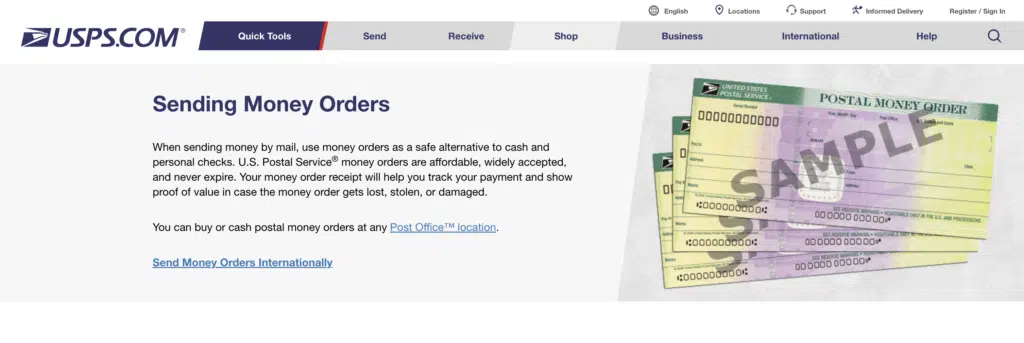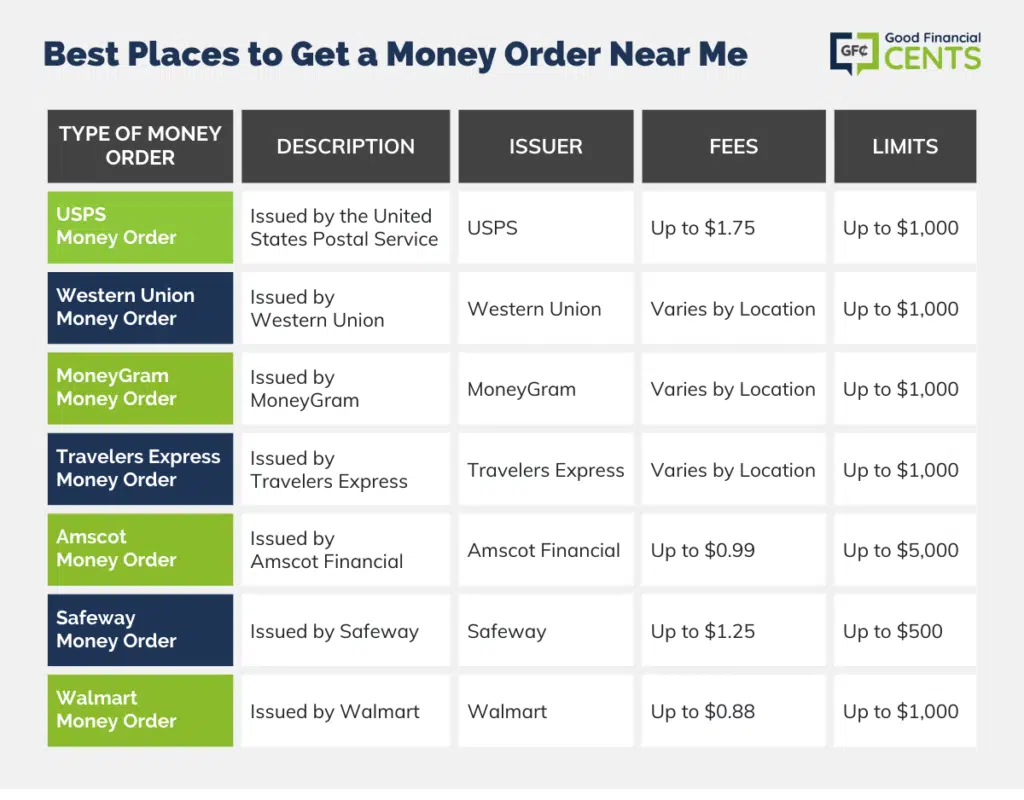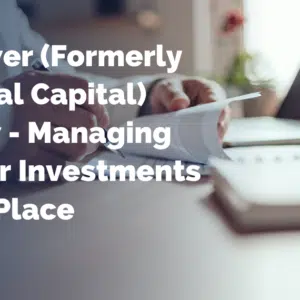With the explosion of electronic payments through online banking and credit and debit cards, money orders have become an almost forgotten payment method.
That’s despite the fact that they’re still commonly used by millions of people.
If you’ve never used a money order, or you don’t know why you might, it’s an option you may want to explore.
There are certain times when a money order can be the preferred method of payment.
Table of Contents
Why Get a Money Order?
Money orders are most valuable in two situations.
You Don’t Have a Bank Account
The first is when you don’t have a bank account. According to the FDIC 8.4 million households, or about 6.5% of all households in the country have no bank relationship. These households are referred to as “un-banked”.
An even larger number of households – 24.2 million, or 18.7% of all households – are considered “under-banked”. These are people who have a bank account, but make extensive use of non-bank financial services. They don’t give a definition of what kind of bank relationship the under-banked have, but we can guess it may be people who have a savings account, but not a checking account.
Collectively, the un-banked and under-banked represent about 25% of all households. Since it’s likely that most in the group don’t have a checking account, money orders are a convenient substitute for checks and electronic payments.
Risk of Disclosing Personal Information
The second situation is where you want to make a payment, but you don’t want to risk disclosing any personal information.
For example, when you write a check, your personal information is at risk. The check not only includes your name, but also the name of your bank, the bank routing number, and your personal account number. That’s all a potential thief would need to steal your identity.
And while credit cards are a more secure way to make a payment, they also carry the risk of identity theft. It opens the possibility that your name and credit card account number could fall into the wrong hands.
But a money order enables you to make payment in a legally acceptable way, without the need to disclose any personal information. Sometimes that’s just what you need!
How Do Money Orders Work?
Money orders work much the same way checks do. The main difference is that while a check is drawn on a bank account, a money order is essentially funded in advance.
But in most other respects, it works the same way. You’ll make a money order payable to an individual or a company, who will then need to endorse the document for payment.
From a recipient’s standpoint, a money order has the advantage that it’s fully funded. That is, it’s nearly as good as cash. This is unlike checks, which can bounce if the issuer’s bank account lacks sufficient funds.
You can purchase money orders at tens of thousands of locations across the country. We’ll get into some of the more common locations a little bit later on.
Money orders can generally be purchased in amounts up to $1,000. If your payment amount is higher, you may need more than one money order.
Fortunately, money orders are relatively cheap. They can cost as little as less than $1, to as much as $5, depending on where they’re purchased.
As for payment, you’ll need to purchase a money order using cash, or a debit or credit card. Checks are not acceptable since the funds are not guaranteed.
But be aware if you use a credit card to purchase of a money order it may be treated as a cash advance. Most credit cards charge a cash advance fee, as well as a higher interest rate on the amount advanced.
But before purchasing a money order to make a payment, first be certain the recipient will accept it. Not all merchants will accept money orders, particularly for online transactions.
Redeeming a Money Order
If you’re paid by a money order, and you need to redeem it, you can generally do it at any location where money orders can be purchased.
In nearly all cases, that will include your bank.
Pros and Cons
Pros
- They’re a commonly accepted method of payment, and often preferred over checks.
- They’re usually less expensive than bank issued checks, like certified or cashier’s checks.
- Because you pay for a money order before it’s issued, there’s no chance it will bounce. That will provide higher assurance to you if you’re receiving a money order, and to a party you’re sending one to.
- They’re safer than carrying cash.
- If you don’t have a checking account, money orders can be sent through the mail. Cash cannot.
Cons
- Money orders are not accepted everywhere.
- They’re much slower than online payments, and thus not warmly welcomed by the majority of merchants.
- They can’t be used to make online purchases.
- Money orders are time-consuming. You’ll need to visit an outlet where you can make a purchase each time you need one.
- While money orders are generally safer than cash or checks, they are susceptible to fraud.
- You’ll have to pay a fee for each money order you purchase. Most banks don’t charge a fee for either checks or online payments.
Best Places to Get a Money Order Near Me
If you’ve never purchased a money order in the past, you’ll be surprised at the thousands of places where they can be either bought or redeemed.
Here are the most common sources:
The US Post Office
The US Post Office is one of the most common sources of money orders. And since there’s probably a post office close to home, they’re available to anyone.

The fee is $2.00 for money orders up to $500, and $2.90 up to $1,000. Domestic postal money orders are available in denominations up to $1,000. They can be purchased using cash, a debit card, or traveler’s checks, but not a credit card.
The post office also allows you to send money orders internationally. However, the maximum amount of any single money order is $750, and the fee is $69.30. That works out to be about 13%, which is an expensive way to send a payment.
Your Own Bank or Credit Union
Most banks and credit unions offer money orders. But you’ll need to have an account with a bank to purchase one. Terms vary by institution.
For example, using JPMorgan Chase as an example – since it’s the largest bank in the country – they offer money orders in amounts up to $1,000, at a cost of $5.
DCU Credit Union similarly offers money orders in denominations of $1,000, but at a cost of $3 each.
These are just examples of banks and credit unions. You’ll need to check with your own bank or credit union to find out what the cost of money orders purchased there will be.
Western Union
Western Union operates primarily through agent locations, which can be retail outlets, convenience stores, and pharmacies. They have more than a half-million agent locations around the world, in over 200 countries, but money orders are available at “only” 56,000 locations.
Fees may vary by agent location, but you can generally expect to pay $1.25 for a money order up to $100, or $1.50 for one up to $1,000. This is less than you will pay at either banks or credit unions, and even a few cents cheaper than the US Post Office.
MoneyGram
MoneyGram is similar to Western Union, in that it works through agent locations. It has more than 340,000 agent locations and they’re spread across 200 countries around the world.
Depending on the location, MoneyGram may be one of the least expensive ways to purchase a money order. They charge a fee of just $0.70 to purchase a money order of up to $1,000. You can find a MoneyGram location by doing a search on the web or on your mobile device.
Pharmacies
Two major pharmacy chains that offer money orders are CVS and Rite Aid. (Interestingly, Walgreen does not.)
CVS has nearly 10,000 stores nationwide. They use MoneyGram money orders, and charge a fee of a $1.25 each, in amounts up to $500. Be sure to check with the CVS location to make sure money orders are available.
Rite Aid has more than 2,500 locations, and offers money orders through Western Union. They are available in denominations up to $500, at a cost of $.099 each.
7-Eleven Stores
7-Eleven is a convenience store with nearly 8,000 locations across the country. Not all stores offer money orders, and the terms may vary somewhat from one store to the next. You should also be aware that you cannot redeem a money order at any locations.
The maximum money order is $500, and it comes with a fee of $0.65, or up to 3% of the amount of the money order. (Ouch! That could mean $15 on a $500 money order, so 7-Eleven shouldn’t be your first choice.)
Walmart
It should come as no surprise that Walmart offers money orders – they have everything else! And with more than 4,700 locations across the country, there’s probably one in your town.
And also not surprisingly, Walmart has one of the lowest prices on money orders you’ll find anywhere. They offer money orders through MoneyGram at the Walmart MoneyCenter. They can be purchased in denominations up to $1,000, with a fee of $0.70.
Grocery Stores
Buying a money order may also be no more complicated than going to your favorite grocery store. Many offer financial services at their customer service desks, that also make money orders available.
For example, Kroger, one of the largest grocery store chains in the country, offers money orders through their Money Services. They use Western Union money orders, which can be purchased in denominations up to $1,000. Fees vary by location, but they advertise it can be as low as $0.69 if you have a Kroger Shopper’s Card.
Safeway also offers money orders through Western Union. The maximum amount is $500, but the cost is just $0.59 each. Unfortunately, Safeway doesn’t redeem money orders.
These are just examples of two of the largest grocery store chains in the country. But if they’re offering money orders, there’s an excellent chance your own grocery store does as well.
Check Cashing Services
Since check-cashing services provide financial services for non-bank customers, many also offer money orders. Since this is such a diverse group of providers, you’ll need to check with the particular check-cashing service you work with for availability and fees.
Also, be careful with fees. Since check-cashing services work mostly with the un-banked, the fees are likely to be higher than what you will pay at any of the other sources on this list.

Know Where to Get Money Orders When You Need One!
If you don’t have a banking relationship, you’re probably already well acquainted with money orders, including where to get them and where to pay the lowest fees.
But if you do have a banking relationship, money orders may be less familiar to you.
But even if you have a bank account, and can make payments by check or online payments, there may still be those situations where using a money order is a more desirable option.
If you need to make a payment to a merchant you’re not familiar with, and you’re at all concerned with protecting your identity, paying by money order will provide that protection.
Even if you don’t plan to use a money order soon, it’s good to familiarize yourself with the practice. If you do, you’ll be ready when the day comes that paying by money order is the better choice.
Final Thoughts on How to Get Money Orders
In an era dominated by electronic transactions, money orders remain a valuable and secure payment method. While often overlooked, they hold significance for those without bank accounts or concerned about disclosing personal information. Money orders function like checks but are prepaid, making them a reliable alternative.
They can be obtained from various sources, including post offices, banks, and convenience stores. Despite their advantages, money orders have limitations, such as being slower than online payments and carrying fees. Familiarizing yourself with their availability and benefits prepares you for situations where money orders prove to be a valuable option.







